On July 5 at noon, all 751 Members of the European Parliament will vote on whether to rubber-stamp the plans for upload filters and the “link tax”, or send them back to the drawing board. Please call them and ask them to do the latter!
What will they vote on exactly? Here’s the complete text of the draft law – below, I’ll decipher the legalese and break down how Articles 11 and 13 will affect you if we don’t stop it from becoming law. (Note: I’ve lightly edited the legal text quoted below for understandability, without changing its meaning.)
* * *
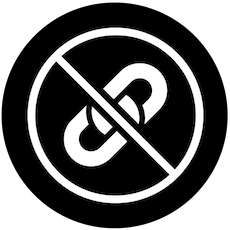 Article 11: A “link tax” with only ineffective exceptions
Article 11: A “link tax” with only ineffective exceptions
1. Member States shall provide press publishers with the [exclusive rights to reproduce and make available works they publish] so that they may obtain fair and proportionate remuneration for the digital use of their press publications by information society service providers.
Here’s how this establishes a “link tax”:
1. It would protect even smallest snippets
Copyright protects creativity: A work needs to meet a “threshold of originality” to be protected. This law does not establish a new copyright in that sense (belonging to an author), but a “neighbouring right” (belonging to the publisher) – and for those, no such threshold applies.
Since no other threshold is established in the law, it would cover even shortest snippets and purely factual headlines like “Angela Merkel meets Theresa May”.
2. Links routinely include such snippets
Links that don’t tell you where they take you make as little sense as blank signposts. That’s why links are routinely illustrated with a short extract of the content they point to – most often the title.
Similarly, when you paste a web address into services like Facebook, Twitter or Reddit, they add a thumbnail-sized image and half a sentence from the article’s contents. They don’t do this to steal that content, but to advertise it: It makes the link more likely to be clicked. In fact, site owners spend a lot of effort making sure these little previews look just the way they want them to.
If Article 11 enters into force, publishers will have an exclusive right to publish such extracts, and thus such links. Everyone else will need to negotiate a license with them.
(But is it justified to call it a “tax”? “Snippet licensing obligation” would be more precise, but that’s hardly understandable to a layperson. And publishers hope it will function like a tax: Publishers don’t want this licensing obligation to result in fewer snippets, just in additional payment for their use. To that end, the text says in Recital 32: “The listing in a search engine should not be considered as fair and proportionate remuneration”: They don’t want search engines to be able to claim that the service of making news articles findable is appropriate payment for snippets used in the course of doing so.)
Ineffective exceptions
1a. [This article] shall not prevent legitimate private and non-commercial use of press publications by individual users.
While the EU Commission wanted everyone to pay for snippets, including individuals, the Legal Affairs Committee wants to limit this to internet platforms.
But of course, such platforms are what individuals use to share news articles today. Hardly anyone runs their own blog: Our profiles on commercial sites are, for better or worse, where we express ourselves.
This law means that platforms will need to stop us from sharing links (with snippets) that they have not negotiated a license for. That will effectively limit our ability to legitimately and for our own private and non-commercial purposes talk about the news of the day with our friends.
It’s illusory to believe that all platforms will just take out licenses from all news sources for all EU countries. That’s a near-impossible feat. It’s much more likely that this law will create a new layer of geoblocking, with error messages like this:
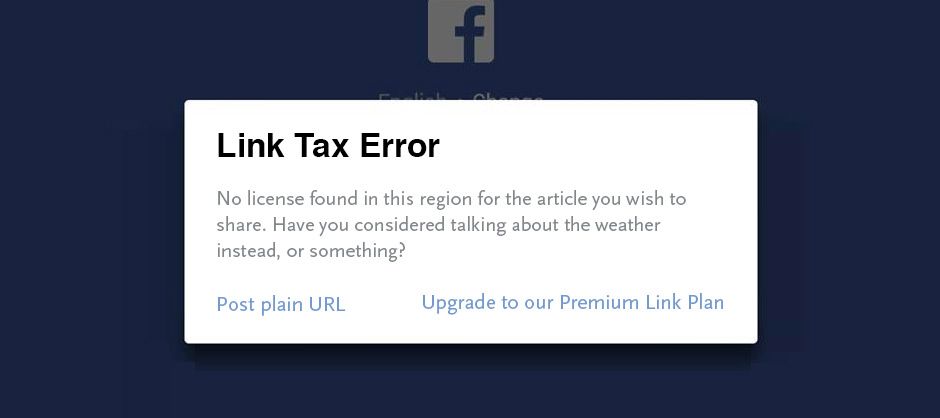 Those affected the worst will be people living in small member states and those wanting to link to less well-known sources – discriminating people based on their country and harming media pluralism.
Those affected the worst will be people living in small member states and those wanting to link to less well-known sources – discriminating people based on their country and harming media pluralism.
2a. [This article] shall not extend to acts of hyperlinking.
As explained above, what we colloquially call a “link” includes a snippet. Nowhere in this nor any prior EU law does it say that an “act of hyperlinking” covers the reproduction of a snippet, or even just a headline. The European Court of Justice has made no such decision. So it doesn’t.
This exception allows you to publish links like this one: “Click here to read a BBC article about this law” – but not the ones you are used to sharing with friends on the web today. It’s window dressing meant to calm the public.
(34) Member States should be able to subject the right to the same provisions on exceptions and limitations as [copyright]
Multiple problems undermine this provision: First of all, it’s optional, so it will lead to wildly different implementations in Europe – another failure for a law that in its title claims to be about the “Digital Single Market”.
Second of all, there’s no “snippet exception” in copyright law. Some kinds of snippets, in some contexts, may be covered under the quotation exception in some member states. But in many, a “quote” means something more akin to a reference in a scientific paper, than to a snippet shared to a social network profile: It needs to be part of a larger copyrighted work, which needs to critically engage with the quoted extract. Many links don’t meet these criteria. To give another example: The French quotation exception doesn’t apply to pictures, so it wouldn’t allow for thumbnail images in snippets.
These exceptions are ineffective and won’t allow us to continue to freely hyperlink.
Conclusion:
Article 11 in the version currently before Parliament will severely limit an everyday action on the web: Sharing links to the news. The criticisms voiced by Europe’s leading academics of IP law stand, as they themselves have confirmed: There’s no economic basis for this new right, it will impede the free flow of information, it won’t help journalists and will harm small publishers. MEPs should not approve it.
Call your MEP now to ask them to refuse to rubber-stamp Article 11 on July 5
* * *
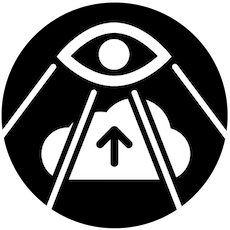 Article 13: Upload filters, shoddily hidden
Article 13: Upload filters, shoddily hidden
Let’s start off with who Article 13 applies to:
2. 4a. ‘Online content sharing service’ means a [web] service one of the main purposes of which is to store and give access to the public to copyright protected works uploaded by its users, which the service optimises.
(37a) ... [services that] optimise content, including amongst others promoting, displaying, tagging, curating, sequencing the uploaded works ...
In other words: Article 13 applies to every platform with an upload form and every app with a “post” button.
Note that “copyright protected works” does not mean “copyright infringing works” – just works that are covered automatically by copyright, like text, photos and videos. That means pretty much all posts and uploads. And when you define “optimising” uploads as including even “displaying” them, that doesn’t narrow things down either.
But wait: The next sentence goes on to define narrow exceptions for Wikipedia, GitHub, eBay, certain scientific repositories and private cloud storage sites (but they better not have a “share” function). These exceptions don’t follow any particular logic, they are just intended to placate the law’s loudest critics so far – but what about all platforms whose users were not following the EU lawmaking process this closely, or that are even yet to be founded?
1a. [...] Online content sharing service providers perform an act of communication to the public and shall conclude fair and appropriate licensing agreements with rightholders [...]
In a radical move that goes beyond the Commission proposal, the Legal Affairs Committee wants to make platforms directly liable for copyright infringements by users. That’s an existential threat to all internet platforms that allow posts or uploads.
By defining that platforms – and not their users – are the ones “communicating” uploaded works “to the public”, they become as liable for the actions of their users as if they had committed them themselves. Let’s imagine a company that makes an app for people to share videos of their cats. If even one user among millions uses the CatVideoWorld3000 app to record a Hollywood movie off a theater screen rather than their kitty, that’d be legally as bad as if the business’ employees had committed the copyright infringement themselves intentionally to profit off of it. The Pirate Bay, MegaUpload and Napster were all much more innocent than any site with an upload form will now be in the eyes of the law.
In order to fully comply with the obligation to “conclude licensing agreements with rightholders”, platforms would need to preemptively get licenses for all copyright-protected works in the world. Not even a giant like Spotify manages to license all music, and that’s much easier than licensing, for example, all photos that exist in the world, or all creative writing. It’s plainly impossible.
In the absence of licensing agreements online content sharing service providers shall take appropriate and proportionate measures leading to the non-availability of copyright or related-right infringing works, while non-infringing works shall remain available.
We’ve established that the “absence of licensing agreements” will be the standard case, applying to almost all posts and uploads on the internet. No platform will be able to guarantee that all user uploads will fall under whatever licensing agreements they may have in place – so all platforms will need to do what this clause says.
Now, what is meant by “measures leading to the non-availability of copyright infringing works”? Another passage gives a clue:
(38) [...] measures to ensure the protection of works uploaded by their users, such as implementing effective technologies.
So we get “effective technologies” “leading to the non-availability” of unlicensed works. It’s clear that this means upload filters that check each uploaded file for infringements before it is allowed to go online.
These filters are bound to block legitimate acts of expression (including, but by no means limited to memes) because they can’t tell apart valid uses like quotation from infringement.
The law may say “non-infringing works shall remain available”, but if not blocking something makes platforms directly liable, and blocking it can lead, at worst, to a user complaint, it’s obvious which side they’ll err on. Expect error messages like these:
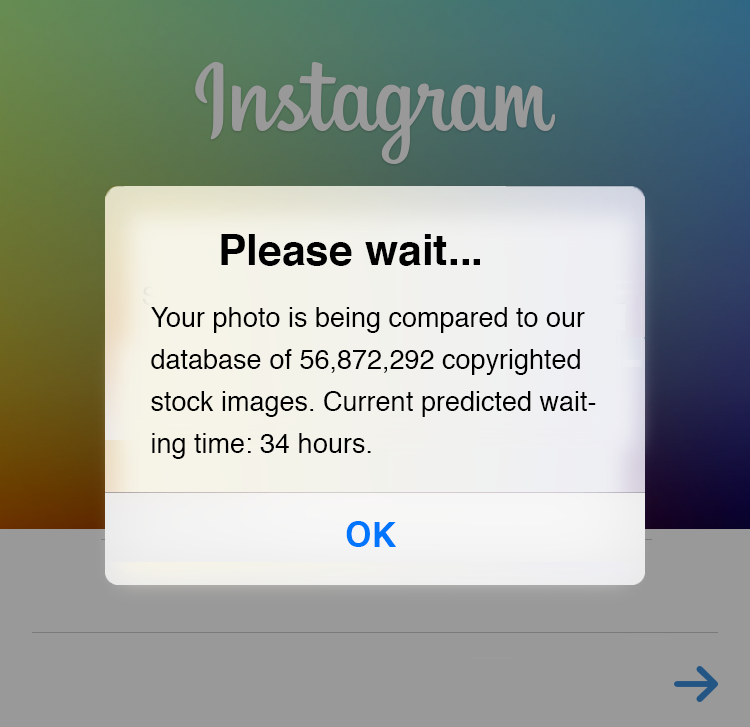
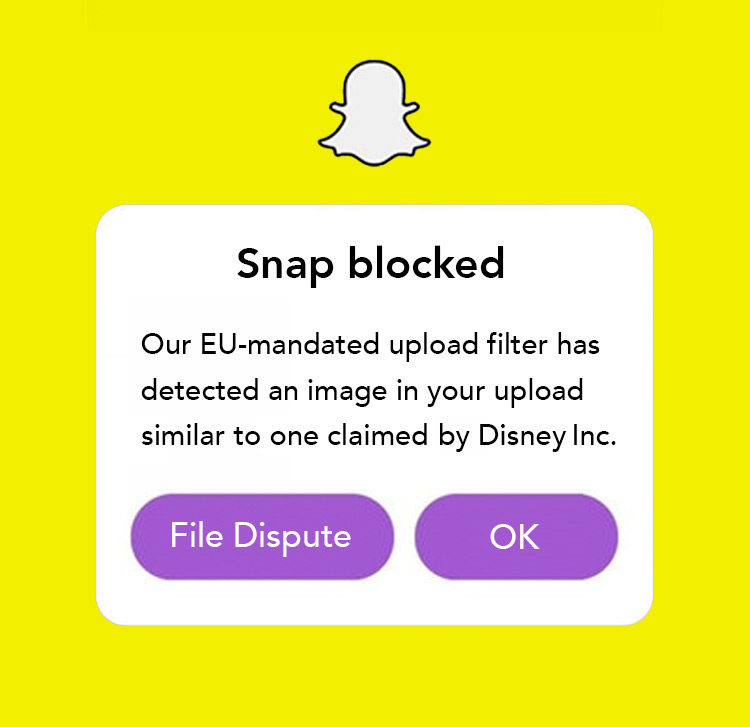
In a final giveaway, the 15 MEPs on the Legal Affairs Committee who voted for this also voted another amendment in, which they forgot to similarly scrub:
(39c) The content recognition technologies market is well developed already [...] However, the absence of clear legal obligations to use these technologies enables dominant market operators to refuse to use those tools [...]
That makes it undeniable: Establishing “clear legal obligations to use” “content recognition technologies” remains the purpose of Article 13.
But wait, there’s something that sounds like a safeguard:
1b. Members States shall ensure that the implementation of such measures [...] shall in accordance with Article 15 of [the E-Commerce Directive], where applicable not impose a general obligation on online content sharing service providers to monitor the information which they transmit or store.
“No general monitoring” would mean no upload filters. But before you get your hopes up, notice that only counts where the liability limitations established in a prior law, the E-Commerce Directive, apply. And:
(38) Online content sharing service providers [...] cannot benefit from the liability exemption provided for in Article 14 of the E-Commerce Directive.
So if a service falls under Articles 14 & 15 of the E-Commerce Directive (which refer to each other), it doesn’t need to monitor. But also, services accepting uploads don’t fall under it. These passages just mean that pure hosting providers (webspace/server providers) don’t need to surveil their users – web services that allow posts or uploads will need to.
Conclusion:
Despite using less scary language, Article 13 as it is before the European Parliament still establishes exactly the “censorship machines” the inventor of the World Wide Web called “an unprecedented step towards surveillance and control”. Independent academics concur that this is the case. MEPs should not approve it.
Taken together with the crushing liability for any infringement that may accidentally slip through, it’d be a surprise if any post or upload not specifically rubber-stamped by Hollywood or the music industry makes it past the filters platforms will need to implement. The internet will increasingly come to resemble cable TV, where a few big players control what goes on air.
Call your MEP now to ask them to refuse to rubber-stamp Article 13 on July 5
To the extent possible under law, the creator has waived all copyright and related or neighboring rights to this work.
I agree that internet should be borderless and uncensored!
Excellent article about a proposed international ‘law’.
For small, independent non-profit sites like ours, both working out what is still permitted and implementing it would be tiresome, to put it mildly. This appears to be more another attempt to control the world wide web rather than a thoughtful, and thought through, method of protecting copyright holders.
It doesn’t matter what I think, It’s a blatant effort to Tax and control the internet. It won’t work btw. Thank you Julia for highlighting this on the European peoples behalf.
I have sent emails to all of our MEP’s about this and have said NO. The only MEP that seems to support us out loud is Ming Flanagan. At least one MEP in Ireland listens to the people/voters.
Thanks again.
We want to have freedom in web
Un essai de traduction en français :
Le 5 juillet à midi, les 751 membres du Parlement européen voteront l’ approbation des filtres de téléversement [upload filters] et la «taxe aux liens» [link tax], ou les renverront à la table à des négociations.
Sur quoi vont-ils voter exactement ? Voici le texte complet du projet de loi – ci-dessous, j’y décrypte le jargon juridique et décompose comment les articles 11 et 13 vont nous affecter
* * *
Article 11 : une “taxe aux liens” qui ne stipule que des exceptions inefficaces
1. Les états membres accordent aux éditeurs de presse [le droit exclusif de reproduire et de diffuser les œuvres qu’ils publient] afin qu’ils puissent obtenir une rémunération équitable et proportionnée pour l’utilisation numérique de leurs publications de presse par les prestataires de services de la société de l’information.
Voici comment cela établit une “taxe aux liens”:
1. Seuls les éditeurs sont protégés
Un travail doit respecter un « seuil d’originalité » à protéger. Cette loi n’établit pas un nouveau droit d’auteur en ce sens (appartenant à un auteur), mais un « droit voisin » (appartenant à l’éditeur).
Comme aucun seuil n’est établi dans la loi, cela va englober même les extraits les plus courts, et les titres purement factuels, comme “Angela Merkel rencontre Theresa May”.
2. Les liens incluent régulièrement de tels extraits
Les liens qui ne vous disent pas où ils vous emmènent ont aussi peu de sens que les panneaux vierges. C’est pourquoi les liens sont régulièrement illustrés avec un court extrait du contenu qu’ils pointent, le titre, le plus souvent .
Lorsque vous collez une adresse web dans des services tels que Facebook, Twitter ou Reddit, ils ajoutent une image de la taille d’une vignette et une phrase du contenu de l’article. Ils ne le font pas pour voler ce contenu, mais pour le rendre plus visible : cela rend le lien plus susceptible d’être cliqué. En fait, les propriétaires de sites consacrent beaucoup d’efforts à faire en sorte que ces aperçus soient représentatifs.
Si l’article 11 entre en vigueur, les éditeurs auront le droit exclusif de publier de tels extraits, et donc de tels liens. Tout le monde devra négocier une licence avec eux.
Mais est-il justifié de l’appeler une “taxe” ? “L’obligation de licence” serait plus précise, mais cela est difficilement compréhensible pour un profane. Les éditeurs espèrent que cela fonctionnera comme une taxe.
Alinéa 32 : «L’inscription dans un moteur de recherche ne doit pas être considérée comme une rémunération équitable et proportionnée» : ils [les éditeurs] ne veulent pas que les moteurs de recherche puissent présenter les articles d’actualité sans paiement en contre-partie des extraits utilisés.
[Cet article] empêche l’utilisation légitime, privée et non commerciale, de publications de presse par des utilisateurs individuels.
Alors que la Commission européenne voulait que tout le monde paie pour des extraits, la commission des affaires juridiques veut limiter cela aux plates-formes internet.
Cette loi signifie que les plates-formes devront nous empêcher de partager des liens (avec des extraits) pour lesquels elles n’ont pas négocié de licence. Cela va effectivement limiter notre capacité à légitimement et pour nos propres fins privées et non commerciales parler des nouvelles de la journée avec nos amis.
Il est illusoire de croire que toutes les plates-formes obtiendront des licences de toutes les sources d’information pour tous les pays de l’union européenne. C’est impossible. Il est beaucoup plus probable que cette loi créera une nouvelle couche de géoblocage, avec des messages d’erreur.
Les personnes les plus touchées seront les personnes vivant dans les états membres de l’union européenne. Discriminer les gens en fonction de leur pays c’est nuire au pluralisme des médias.
2a. [Cet article] s’étendra aux liens hypertexte.
Comme expliqué ci-dessus, ce que nous appelons familièrement un «lien» inclut un extrait. Nulle part dans cette loi, ni dans aucune loi antérieure de l’ union européenne, il n’est écrit qu’un hyperlien couvre la reproduction d’un extrait, ou même seulement un titre. La cour de justice européenne n’a pas pris une telle décision.
Vous n’aurez que le droit de publier des liens sous cette forme : ” Cliquez ici pour lire un article de la BBC sur cette loi “. C’est une vitrine destinée à calmer le public, mais vous ne pourrez plus partager [de liens] comme vous en aviez l’habitude jusqu’à aujourd’hui. .
(34) Les états membres devraient être en mesure de soumettre le droit aux mêmes dispositions en matière d’exceptions et de limitations que [le droit d’auteur]
Des problèmes multiples sapent cette disposition : tout d’abord, elle est facultative , ce qui conduira à des implémentations radicalement différentes en Europe. C’est encore un échec pour une loi qui, dans son titre, parle du «marché unique numérique».
Deuxièmement, il n’y a pas d’exception “extrait” dans la loi sur les droits d’auteur. Dans certains contextes, certains types d’extraits peuvent être couverts par l’exception de citation dans certains états membres. Mais pour beaucoup, une “citation” signifie quelque chose de plus proche d’une référence dans un article scientifique, que d’un extrait partagé sur un profil de réseau social. Cela doit faire partie d’un plus vaste travail critique sur le copyright. De nombreux liens ne répondent pas à ces critères. Pour donner un autre exemple : l’exception de citation française ne s’applique pas aux images, elle ne permet donc pas les images miniatures dans les extraits.
Ces exceptions sont inefficaces et ne nous permettront pas de continuer à créer du lien hypertexte.
Conclusion:
L’article 11 dans la version actuellement devant le Parlement limitera sévèrement une action quotidienne sur le web : partager des liens d’actualité. Les critiques émises par les principaux universitaires européens en droit de la propriété intellectuelle sont : il n’y a pas de base économique pour ce nouveau droit, cela va sévèrement entraver la libre circulation de l’information, n’aidera pas les journalistes et nuira aux petits éditeurs. Les députés ne devraient pas l’approuver.
Appelez votre député européen pour lui demander de refuser d’approuver l’article 11 le 5 juillet.
NO. To all of it. Anyone wishing to control their copyright can do so by putting a gate in place, like the FT have done. It is not up to anyone else to collect taxes and grant licences, other than those sharing content, if they so wish.
This is simply an infringement of free speech. A dangerous system, extracting wealth unjustified. This needs to be stopped immediately.
Today’s content recognition technologies are not perfect. Have you ever tried searching for a portrait photo using Google’s reverse image search tool? Quite often, Google will find a photo of someone else, provided that the background colour is approximately the same. Oh, and Google Street View blocks people’s faces to protect their privacy – but many statues are misidentified as living people and so have their faces blurred. There are lots of false positives.
I am building a privacy-focused media hosting platform (currently based in the US) and if this passes no European customers for me it looks like. Sadly I’m hoping to re-located the company to Berlin next year but this would make it as bad as trying to move to China on a technological/legal/censorship level. I’m shocked – I have thought that Europeans were the more sensible party when it came to responsible regulation of the internet and I’m deeply dismayed.
I manually sent my MEPs a mail about the current concerns of article 11 and 13, such as how badly 11 had an effect in germany and spain, and why 13 is wholly improbable and or impossible to execute from a technical standpoint, I have not gotten a single answer yet unfortunately.
Dear Julia
I agree with every your words, only, please, dont’t use PROTECT, but RESTRICT, VINCULATE, CONTROL, since copyWRONG is, as you know, all about monopolistic control, so you have to say
RESTRICT SNIPPETS OF TEXT…
RESTRICT THE FILE UPLOAD…
RESTRICT THE INTERACTION OF PEOPLE…
and so on…
Why don’t we just close all internet connections to Europe and block all traffic since even publishing the word “The” off the european parliament website would be considered an infringement and thus could not be published.